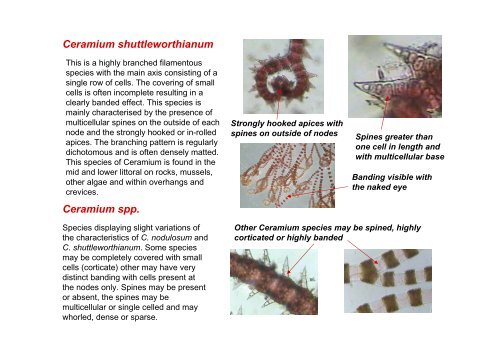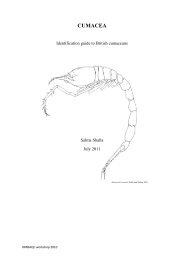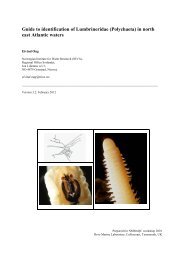s A Field Guide to the British Seaweeds - NMBAQC
s A Field Guide to the British Seaweeds - NMBAQC
s A Field Guide to the British Seaweeds - NMBAQC
You also want an ePaper? Increase the reach of your titles
YUMPU automatically turns print PDFs into web optimized ePapers that Google loves.
Ceramium shuttleworthianum<br />
This is a highly branched filamen<strong>to</strong>us<br />
species with <strong>the</strong> main axis consisting of a<br />
single row of cells. The covering of small<br />
cells is often incomplete resulting in a<br />
clearly banded effect. This species is<br />
mainly characterised by <strong>the</strong> presence of<br />
multicellular spines on <strong>the</strong> outside of each<br />
node and <strong>the</strong> strongly hooked or in-rolled<br />
apices. The branching pattern is regularly<br />
dicho<strong>to</strong>mous and is often densely matted.<br />
This species of Ceramium is found in <strong>the</strong><br />
mid and lower lit<strong>to</strong>ral on rocks, mussels,<br />
o<strong>the</strong>r algae and within overhangs and<br />
crevices.<br />
Ceramium spp.<br />
Species displaying slight variations of<br />
<strong>the</strong> characteristics of C. nodulosum and<br />
C. shuttleworthianum. Some species<br />
may be completely covered with small<br />
cells (corticate) o<strong>the</strong>r may have very<br />
distinct banding with cells present at<br />
<strong>the</strong> nodes only. Spines may be present<br />
or absent, <strong>the</strong> spines may be<br />
multicellular or single celled and may<br />
whorled, dense or sparse.<br />
Strongly hooked apices with<br />
spines on outside of nodes<br />
Spines greater than<br />
one cell in length and<br />
with multicellular base<br />
Banding visible with<br />
<strong>the</strong> naked eye<br />
O<strong>the</strong>r Ceramium species may be spined, highly<br />
corticated or highly banded




